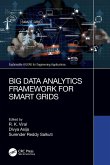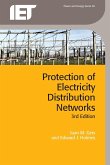Deregulated Electricity Structures and Smart Grids
Herausgeber: Khan, Baseem; Padmanaban, Sanjeevikumar; Mahela, Om
Deregulated Electricity Structures and Smart Grids
Herausgeber: Khan, Baseem; Padmanaban, Sanjeevikumar; Mahela, Om
- Broschiertes Buch
- Merkliste
- Auf die Merkliste
- Bewerten Bewerten
- Teilen
- Produkt teilen
- Produkterinnerung
- Produkterinnerung
The text discusses aspects related to the deregulated market structures under the smart grid system in a single volume. It will be an ideal reference text for graduate students and professionals in the fields of electrical engineering, electronics and communication engineering, renewable energy, and clean technologies.
Andere Kunden interessierten sich auch für
![Big Data Analytics Framework for Smart Grids Big Data Analytics Framework for Smart Grids]() Big Data Analytics Framework for Smart Grids82,99 €
Big Data Analytics Framework for Smart Grids82,99 €![An Introduction to the Study of Central Station Electricity Supply An Introduction to the Study of Central Station Electricity Supply]() Albert GayAn Introduction to the Study of Central Station Electricity Supply26,99 €
Albert GayAn Introduction to the Study of Central Station Electricity Supply26,99 €![Towards Future Smart Power Systems with High Penetration of Renewables Towards Future Smart Power Systems with High Penetration of Renewables]() Towards Future Smart Power Systems with High Penetration of Renewables151,99 €
Towards Future Smart Power Systems with High Penetration of Renewables151,99 €![Protection of Electricity Distribution Networks Protection of Electricity Distribution Networks]() Juan M GersProtection of Electricity Distribution Networks131,99 €
Juan M GersProtection of Electricity Distribution Networks131,99 €![A Popular Treatise on Medical Electricity: Showing the Influence of Electricity as a Remedy for Diseases; and Plain & Practical Directions for Its App A Popular Treatise on Medical Electricity: Showing the Influence of Electricity as a Remedy for Diseases; and Plain & Practical Directions for Its App]() Henry WoodwardA Popular Treatise on Medical Electricity: Showing the Influence of Electricity as a Remedy for Diseases; and Plain & Practical Directions for Its App15,99 €
Henry WoodwardA Popular Treatise on Medical Electricity: Showing the Influence of Electricity as a Remedy for Diseases; and Plain & Practical Directions for Its App15,99 €![Electricity for the Farm: Light, Heat and Power by Inexpensive Methods From the Water Wheel or Farm Engine Electricity for the Farm: Light, Heat and Power by Inexpensive Methods From the Water Wheel or Farm Engine]() Frederick Irving AndersonElectricity for the Farm: Light, Heat and Power by Inexpensive Methods From the Water Wheel or Farm Engine25,99 €
Frederick Irving AndersonElectricity for the Farm: Light, Heat and Power by Inexpensive Methods From the Water Wheel or Farm Engine25,99 €![Renewable Energy Integration to the Grid Renewable Energy Integration to the Grid]() Renewable Energy Integration to the Grid62,99 €
Renewable Energy Integration to the Grid62,99 €-
-
-
The text discusses aspects related to the deregulated market structures under the smart grid system in a single volume. It will be an ideal reference text for graduate students and professionals in the fields of electrical engineering, electronics and communication engineering, renewable energy, and clean technologies.
Produktdetails
- Produktdetails
- Verlag: CRC Press
- Seitenzahl: 332
- Erscheinungstermin: 7. Oktober 2024
- Englisch
- Abmessung: 234mm x 156mm x 18mm
- Gewicht: 506g
- ISBN-13: 9781032235110
- ISBN-10: 103223511X
- Artikelnr.: 71557196
- Herstellerkennzeichnung
- Libri GmbH
- Europaallee 1
- 36244 Bad Hersfeld
- gpsr@libri.de
- Verlag: CRC Press
- Seitenzahl: 332
- Erscheinungstermin: 7. Oktober 2024
- Englisch
- Abmessung: 234mm x 156mm x 18mm
- Gewicht: 506g
- ISBN-13: 9781032235110
- ISBN-10: 103223511X
- Artikelnr.: 71557196
- Herstellerkennzeichnung
- Libri GmbH
- Europaallee 1
- 36244 Bad Hersfeld
- gpsr@libri.de
Baseem Khan (M'16) received his Bachelor of Engineering degree in Electrical Engineering from Rajiv Gandhi Technological University, Bhopal, India in 2008. He received his Master of Technology and Doctor of Philosophy degrees in Electrical Engineering from the Maulana Azad National Institute of Technology, Bhopal, India, in 2010 and 2014, respectively. Currently, he is working as faculty member at Hawassa University, Ethiopia. His research interest includes power system restructuring, power system planning, smart grid technologies, meta-heuristic optimization techniques, reliability analysis of renewable energy system, power quality analysis and renewable energy integration. Om Prakash Mahela (M'13) was born in Sabalpura, Kuchaman City, Rajasthan, India, in 1977. He received the B.E. degree from the College of Technology and Engineering, Udaipur, India, in 2002, and the M.Tech. degree from Jagannath University, Jaipur, India, in 2013, and the Ph.D. degree from Indian Institute of Technology Jodhpur, India, in 2018, all in electrical engineering. From 2002 to 2004, he was an Assistant Professor with the Rajasthan Institute of Engineering and Technology, Jaipur, India. From 2004 to 2014, he was a Junior Engineer with the Rajasthan Rajya Vidyut Prasaran Nigam Ltd., India and Assistant Engineer since July 20014. He has authored more than 100 research articles and book chapters. His research interest includes power quality, power system planning, grid integration of renewable energy sources, FACTS devices, transmission line protection, and condition monitoring. He was a recipient of the University rank certificate in 2002, Gold Medal in 2013, best research paper award from IEEE ICSEDPS 2018, C.V. Raman Gold Medal in 2019 and outstanding Reviewer Awards from Elsevier Journals. P. Sanjeevikumar is SMIEEE'15, FIETE'18, FIE'18, FIET'19 and Charted Engineer (CEng., India) received his Bachelor (First Class), Master (Distinction), Ph.D Degree in Electrical Engg. from the University of Madras, Pondicherry University (India, 2002, 2006), University of Bologna (Italy, 2012). Research work focused in the field of Power Electronics (multi-phase/multilevel converters). Editorial Board / Associate Editor of IEEE Systems Journal, IET PEL, subject editor of IET RPG, subject editor of IET GTD, IEEE Access, Turkish Journal of Electrical Engineering & Computer Science, Journal of Power Electronics (JPE-Korea), FACETS (Canada). Hassan Haes Alhelou (S'15) is a faculty member at Tisheen University, Lattakia, Syria. He is also a PhD researcher at the Isfahan University of Technology (IUT), Isfahan, Iran. He is included in the 2018 Publons list of the top 1% best reviewer and researchers in the field of engineering. He was the recipient of the Outstanding Reviewer Award from Energy Conversion and Management Journal in 2016, ISA Transactions Journal in 2018, Applied Energy Journal in 2019, and many other Awards. He was the recipient of the best young researcher in the Arab Student Forum Creative among 61 researchers from 16 countries at Alexandria University, Egypt, 2011. He has published more than 30 research papers in the high quality peer-reviewed journals and international conferences. He has also performed more than 160 reviews for high prestigious journals including IEEE Transactions on Industrial Informatics, IEEE Transactions on Industrial Electronics, Energy Conversion and Management, Applied Energy, International Journal of Electrical Power \& Energy Systems. He has participated in more than 15 industrial projects. His major research interests are Power systems, Power system dynamics, Power system operation and control, Dynamic state estimation, Frequency control, Smart grids, Micro-grids, Demand response, Load shedding, and Power system protection.
1. Regulated Vs Deregulated Electricity Market: A Brief Timeline. 2.
Deregulated Smart Grid and Electricity Market Structures. 3. Issues under
Deregulated Market Structure and Ever-Increasing Conventional Grid
Inadequacy. 4. Growing Competition between Utilities and its Impact on
Customers. 5. Transition and Complexity Impacts on Customers. 6. Climate
Issues. 7. Smart Grid and Microgrid Technologies in Deregulated
Environment. 8. Smart Grids and Microgrids with High Renewable Shares. 9.
Design, Modelling, and Management of Smart Grids and Microgrids. 10. Smart
Grid and Microgrid Reliability, Sustainability, Flexibility, and
Resiliency. 11. Harmonics Mitigation and Reactive Power Compensation in
Deregulated Smart Grid. 12. Distributed Generation, Storage, and
Management. 13. Novel Disruptive Enabling Technologies. 14. Business Models
for Different Electricity Market Players. 15. Demand Side Management and
Demand Response. 16. The Sizing, Placement, and Operation of Energy Storage
Systems and Electric Vehicles in Smart Grids. 17. Big Data for Smart
Vehicular System. 18. ICT Technologies for Smart Grid. 19. Costs and
Revenues Issues in Deregulated Smart Grid. 20. Futuristic Electricity
Market Models. 21. Digitalization of Utilities. 22. Solution Techniques for
Deregulated Smart Grid Problems. 23. Categorization of the Solution
Techniques: Artificial Intelligence, Meta-Heuristics, Mathematical
Techniques. 24. Policy Changes for the Deregulated Electricity Market
Development. 25. Electricity Tariff Development under Smart grid and Micro
Grid Structures. 26. Economical and Technical Impacts of Deregulation on
Green Energy Development. 27. Practical Case Studies.
Deregulated Smart Grid and Electricity Market Structures. 3. Issues under
Deregulated Market Structure and Ever-Increasing Conventional Grid
Inadequacy. 4. Growing Competition between Utilities and its Impact on
Customers. 5. Transition and Complexity Impacts on Customers. 6. Climate
Issues. 7. Smart Grid and Microgrid Technologies in Deregulated
Environment. 8. Smart Grids and Microgrids with High Renewable Shares. 9.
Design, Modelling, and Management of Smart Grids and Microgrids. 10. Smart
Grid and Microgrid Reliability, Sustainability, Flexibility, and
Resiliency. 11. Harmonics Mitigation and Reactive Power Compensation in
Deregulated Smart Grid. 12. Distributed Generation, Storage, and
Management. 13. Novel Disruptive Enabling Technologies. 14. Business Models
for Different Electricity Market Players. 15. Demand Side Management and
Demand Response. 16. The Sizing, Placement, and Operation of Energy Storage
Systems and Electric Vehicles in Smart Grids. 17. Big Data for Smart
Vehicular System. 18. ICT Technologies for Smart Grid. 19. Costs and
Revenues Issues in Deregulated Smart Grid. 20. Futuristic Electricity
Market Models. 21. Digitalization of Utilities. 22. Solution Techniques for
Deregulated Smart Grid Problems. 23. Categorization of the Solution
Techniques: Artificial Intelligence, Meta-Heuristics, Mathematical
Techniques. 24. Policy Changes for the Deregulated Electricity Market
Development. 25. Electricity Tariff Development under Smart grid and Micro
Grid Structures. 26. Economical and Technical Impacts of Deregulation on
Green Energy Development. 27. Practical Case Studies.
1. Regulated Vs Deregulated Electricity Market: A Brief Timeline. 2.
Deregulated Smart Grid and Electricity Market Structures. 3. Issues under
Deregulated Market Structure and Ever-Increasing Conventional Grid
Inadequacy. 4. Growing Competition between Utilities and its Impact on
Customers. 5. Transition and Complexity Impacts on Customers. 6. Climate
Issues. 7. Smart Grid and Microgrid Technologies in Deregulated
Environment. 8. Smart Grids and Microgrids with High Renewable Shares. 9.
Design, Modelling, and Management of Smart Grids and Microgrids. 10. Smart
Grid and Microgrid Reliability, Sustainability, Flexibility, and
Resiliency. 11. Harmonics Mitigation and Reactive Power Compensation in
Deregulated Smart Grid. 12. Distributed Generation, Storage, and
Management. 13. Novel Disruptive Enabling Technologies. 14. Business Models
for Different Electricity Market Players. 15. Demand Side Management and
Demand Response. 16. The Sizing, Placement, and Operation of Energy Storage
Systems and Electric Vehicles in Smart Grids. 17. Big Data for Smart
Vehicular System. 18. ICT Technologies for Smart Grid. 19. Costs and
Revenues Issues in Deregulated Smart Grid. 20. Futuristic Electricity
Market Models. 21. Digitalization of Utilities. 22. Solution Techniques for
Deregulated Smart Grid Problems. 23. Categorization of the Solution
Techniques: Artificial Intelligence, Meta-Heuristics, Mathematical
Techniques. 24. Policy Changes for the Deregulated Electricity Market
Development. 25. Electricity Tariff Development under Smart grid and Micro
Grid Structures. 26. Economical and Technical Impacts of Deregulation on
Green Energy Development. 27. Practical Case Studies.
Deregulated Smart Grid and Electricity Market Structures. 3. Issues under
Deregulated Market Structure and Ever-Increasing Conventional Grid
Inadequacy. 4. Growing Competition between Utilities and its Impact on
Customers. 5. Transition and Complexity Impacts on Customers. 6. Climate
Issues. 7. Smart Grid and Microgrid Technologies in Deregulated
Environment. 8. Smart Grids and Microgrids with High Renewable Shares. 9.
Design, Modelling, and Management of Smart Grids and Microgrids. 10. Smart
Grid and Microgrid Reliability, Sustainability, Flexibility, and
Resiliency. 11. Harmonics Mitigation and Reactive Power Compensation in
Deregulated Smart Grid. 12. Distributed Generation, Storage, and
Management. 13. Novel Disruptive Enabling Technologies. 14. Business Models
for Different Electricity Market Players. 15. Demand Side Management and
Demand Response. 16. The Sizing, Placement, and Operation of Energy Storage
Systems and Electric Vehicles in Smart Grids. 17. Big Data for Smart
Vehicular System. 18. ICT Technologies for Smart Grid. 19. Costs and
Revenues Issues in Deregulated Smart Grid. 20. Futuristic Electricity
Market Models. 21. Digitalization of Utilities. 22. Solution Techniques for
Deregulated Smart Grid Problems. 23. Categorization of the Solution
Techniques: Artificial Intelligence, Meta-Heuristics, Mathematical
Techniques. 24. Policy Changes for the Deregulated Electricity Market
Development. 25. Electricity Tariff Development under Smart grid and Micro
Grid Structures. 26. Economical and Technical Impacts of Deregulation on
Green Energy Development. 27. Practical Case Studies.









